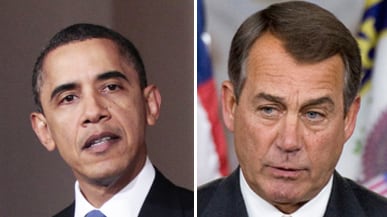Rewind to a few months, weeks, or even just two days ago, and Peter Wolfgang, executive director of the Family Institute of Connecticut, was feeling like a profound underdog in his fight against gay marriage. “Let’s just say the deck was stacked against us, it was not a level playing field,” says Wolfgang. But today he is a happy man.

The administration’s surprise announcement Wednesday that part of the Defense of Marriage Act was unconstitutional and that it would no longer defend the 1996 law in federal court—including in a key Connecticut case, Pederson v. Office of Personnel Management—has changed everything for him, and for the best. The flurry of emails and Facebook messages he woke up to Thursday morning are a morale boost, he says, but what really invigorates him is the chance to step in and make a difference. He’s currently in talks with lawyers to determine if his organization is now free to take a radical step and intervene in the case, since administration officials now refuse to do so—and since, in his view, they were pretty darn bad at it anyway.
“If anything, this increases the chances of the traditional marriage side,” says Wolfgang. “The Obama policy now is now much more honest than it was just 24 or 48 hours ago.” And honesty, explains Wolfgang, paves the way for the real advocates of traditional marriage to fight and have a voice.
In previous cases in which the government represented DOMA, he says, “they were not defending the law to the best of their ability, it was almost as if they were colluding with the other side,”—and, he adds, barring his organization from participating as interveners. Wolfgang’s big fear, however, is that the “other side” will get gay marriage to the Supreme Court in such a way that state laws and statutes supporting traditional marriage (so called mini-DOMAs or super-DOMAs) will get wiped out. “They are looking for their Roe v. Wade of same-sex marriage to overturn laws across the country in one fell swoop.”
“If anything, this increases the chances of the traditional marriage side.”
By failing to defend marriage, the administration may open the door for those passionately opposed to gay marriage to have what they feel they’ve been lacking: a stronger legal voice. In Massachusetts, which is also in the midst of a legal challenge to DOMA, traditional marriage activists, after the initial shock, are finding themselves equally emboldened. Kris Mineau of the Massachusetts Family Institute says, “It’s a horrible situation when the president and the attorney general refuse to carry out their constitutional duties. We are now asking Congress to do its job.” But he says the law, in his view, “says that under unusual circumstances people who are friends of the court can participate in oral arguments.” Previously barred from doing so in the state’s key DOMA challenge, Gill v. Office of Personnel Management, he says, his legal team is working on documents to take part in oral arguments “with real resources and with people who have a passion for success” in battling gay marriage. Mineau says the government’s defense of DOMA thus far “has amounted to something along the lines of ‘we’re personally against DOMA but we’re here today to defend it.’” That watered-down approach, he says, left traditional marriage supporters feeling hopeless.
Brian Brown, president of the National Organization for Marriage, which has helped roll back gay marriage rights in California and other states, says he has been in talks with the offices of House Republican leaders John Boehner and Eric Cantor long before Obama’s decision “because the government was essentially throwing the case. Now the mask is off and it makes it easier for the House to intervene.” Wednesday’s announcement, he says, just makes his lobbying efforts easier.
• Eve Conant and Daniel Stone: Obama Drops Gay Marriage BombGay marriage opponents see one member of Congress as their potential savior. “We trust that Speaker Boehner and the Congress will appoint a special counsel to do the job the Department of Justice refuses to do,” says Mineau. An email blast to 20,000 supporters in Massachusetts alone is urging them to call and email the speaker’s office.
“Speaker John Boehner is on our side,” Wolfgang says. “His position all along has been in favor of traditional marriage and DOMA. We’re pleased to have him in the House now that the president has made clear he will not uphold his duty to defend the law of the land.” Boehner’s office did not immediately return a call for comment, but late Wednesday, his spokesman Michael Steel fired off an email demanding that the president “explain why he thinks now is the appropriate time to stir up a controversial issue that sharply divides the nation.”
The issue will heat up on Capitol Hill in the coming weeks, for lawmakers on both sides of the issue. Within hours of the administration’s announcement, lawyers in the Republican House leadership offices were scouring case law for legal precedent of the president declaring an existing law unconstitutional.
“We lost our lawyer [the Justice Department] so what we’ll do now is find someone else to defend us and our laws,” says a senior Republican House staffer close to the Judiciary committee who asked not to be named discussing party strategy.
Committee lawyers have been summoned early next week to meet with Boehner and other officials to discuss their options. One leading strategy would be to stage a sort of legislative intervention, in which Congress’ counsel would remove the Justice Department’s authority to defend DOMA.
Administration officials aren’t opposed to that idea. In a letter to Boehner, Attorney General Eric Holder suggested Republican leaders appoint more lawyers to defend the law themselves, without Justice attorneys.
But lawmakers who support gay marriage are also vowing to push ahead. After the White House bombshell, Rep. Jerrold Nadler announced he would revive a bill he pushed in 2009 that would repeal DOMA entirely. “The fact is we’re getting more momentum, and now more than we’ve ever had,” the New York Democrat says. His last effort drew more than 100 co-sponsors but fell short of final passage, his staff says, because Democrats, who were then in the majority, were focused on other gay rights issues, such as repealing Don’t Ask Don’t Tell. Still Nadler knows it’s a long shot, especially with his party out of power.
Eve Conant is a Newsweek staff reporter covering immigration, politics, social, and culture issues.







